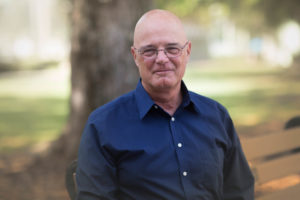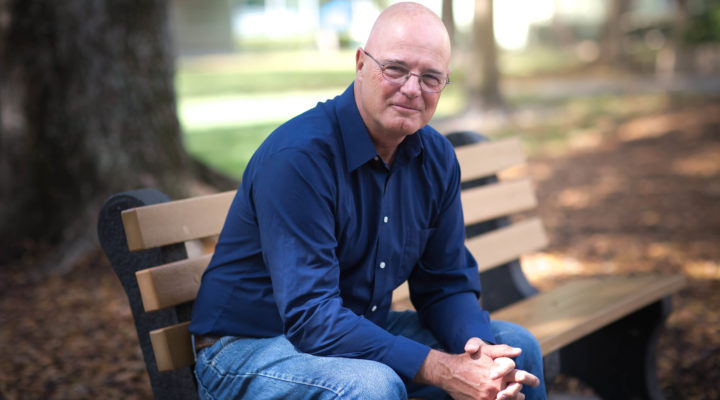Author, theologian and activist Brian McLaren was calling for a new kind of Christianity well before the nones arose to challenge the very foundation of the American church.
But the former school teacher and pastor isn’t saying “I told you so” now as congregations close, merge or stagnate in record numbers. Instead, he’s doing what he always does: challenging Christians to change the way they understand themselves and minister to others.

Brian McLaren (Photo/Hannah Davis/Wild Artistry Photography)
And one way Christians must change is in the way they change, he said.
“The church growth movement of the 1990s was based on the assumption that people really wanted to go to church, but there were obstacles – the music wasn’t good enough or the preaching wasn’t good enough,” he said. “I think that was true in the 90s. But today, people are saying why would I even want to be part of this thing?”
What a lot of young people see from Christians these days isn’t good, he added: “Bigotry and denial of science and straining at gnats and swallowing camels.”
McLaren is the author of The Great Spiritual Migration: How the World’s Largest Religion is Seeking a Better Way to be Christian, and co-author of a new children’s book titled Cory & The Seventh Story. He spoke with Baptist News Global this week about his work and the ways he sees that the church must be transformed.
You’ve been calling for a new kind of Christianity for many years. Will it ever arrive – is it even supposed to?
Everything that exists in a changing environment has to change in order to survive. That is one of Darwin’s basic insights and is obvious in the scriptures when you think that we don’t worship at rock altars and a tabernacle any more. Change is inevitable in the spiritual life and certainly in the life of our congregations. I would have to say I’m deeply worried in our congregations that too few of us will change enough, fast enough. So, I feel a real sense of urgency.
Speaking of change: How are your own ministry and interests changing?
I was a pastor for 24 years and that’s what forced me to change. The reality of people’s lives and the changing role of church in society. So, my 24 years as a pastor taught me the necessity of change and how difficult it can be for many religious people. In recent years, for me, it feels like you pull out one little thread and you realize it’s connected to another thread, and another. I have gone through a very profound change in my understanding of the gospel, salvation, sanctification. All of that has been complicated for me by a deepening understanding of church history and that what many of us think of as the old-time religion only goes back to the 1930s or the 1950s. It’s brought me to a place I see the kind of change the church faces is much less like reformation but more rebirth and resurrection.
Is the emergent/emerging church movement still a thing?
That’s a term I only use when other people bring it up to me. We live in a world where everybody is interested in branding. There was a certain desire to create the next hot thing in the church industrial complex. That wasn’t my goal, ever. What I have always said is that the kind of movement that we need is not here yet. The first step of a movement is critical conversation, which sometimes takes decades. Sometimes it takes over a century.
You’ve said churches forget why they are here. Why are they here?
Unfortunately, the reason they are here is to keep clergy employed and buildings open and donors happy. If we go back to Jesus’ life and teaching, he was modeling a way of life that was centered on love and he sent his disciples out to form other disciples and, ultimately, I think that is why we should be here – to form individuals and communities as agents of the love of Christ.
Is it, then, partly an issue of spiritual formation?
What has happened to a lot of us is we have ended up with a checklist mentality. There are all these things we have to do because that’s what we think we have to do. On Sunday morning we have a liturgical checklist. In the course of a year we have certain events. Every once in a while, we have to go back and say, why are we doing these things? Are they furthering a grand sense of mission? When we realize that, I feel it’s necessary to go back and say what are we here for and align everything we do around that fresh sense of mission. For example, if our job is to produce people who love God and love their neighbors as themselves and the earth, then immediately we would say we are not doing a very good job of that. In the New Testament, in First Corinthians 13, Paul says if we don’t have love, it’s worth absolutely nothing. In Galatians he says the only thing that matters is faith expressing itself in love. I had to admit as a pastor I met a lot of people who had a lot of pew time and knew a lot of Bible lore. But the more they knew they just became more arrogant and critical and they weren’t becoming more loving, and that raises real questions about the value of what we are doing.
You have said churches should become “studios of love.” What’s that about?
Think about the difference between a classroom and a studio. In a classroom you get information and you are measured by your ability to pass a test. In a studio you develop know-how and skill and you are evaluated on what you are capable of producing. If our churches saw themselves not just as teaching information about the Bible or systematic theology, but saw themselves as studios of love, we would radically redesign everything we are doing. How does this prayer, sermon or class contribute? Where are we giving people honest feedback? Who are we setting up as living mentors to help younger people get our vision of producing loving people?
Do you see congregations practicing the “adaptive change” you see as vital?
Every church is doing it to some degree. The problem is we are almost doing it by mistake. For example, we put out bagels and coffee every Sunday. But we are just doing it without realizing what we are really doing, which is giving people a chance to be together and to practice the skills of love. What isn’t happening is a strong sense of alignment, or an acknowledgment that this is our main purpose for living.
To what extent are the challenges facing churches generational?
I think it is highly generational in that our churches, our Protestant churches, took shape in cultural context that matches the context of our oldest members. Younger generations just don’t see the point of this whole thing the way the older generations do. I frankly feel that’s a good thing. The people who don’t come to church are giving a message to the church that the church just wouldn’t hear any other way. All the talk of generational issues that only focus on style or on music, they are really missing the point. What is going on is so much deeper than that.


